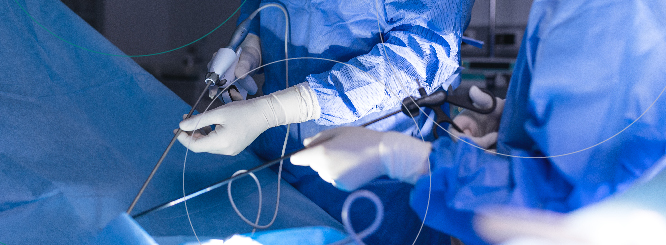
When a patient thinks about the possible complications that can take place during bariatric surgery, or any type of surgery for that matter, they don’t usually have allergy to sutures at the top of their list. In fact, it’s something that many people don’t even take into account and can come as a big, unwanted surprise during their recovery process.
As a patient begins preparing for their surgery, they’re in constant communication with their doctor to ensure that the medical procedure is successful; this means applying some changes to their lifestyle, cutting back on some types of foods and beverages, and going over their allergy list, especially when it comes to how their body reacts to anesthesia.
There are many reasons why a person can have or develop an allergy to sutures and we’ll explore that, as well as other topics, in this article. It’s very important for the patient to be aware if they have an allergy to sutures in order to avoid any complications that can put their health at risk. At LIMARP®, Dr. Liza María Pompa González and her team of qualified doctors ensure that every step of your surgical process is carried out safely. This means providing the necessary information regarding the before and after parts of any surgical procedure; this can include making sure that the patient doesn’t have an allergy to sutures or to any other kind of medication used during this time.
As always, we’d like to remind you that the information in this article is general and that if you have any more questions regarding a possible allergy to sutures, please contact your doctor in order to see if you can get tested and avoid any postoperative complications. Sutures can become infected if they’re not tended to correctly, which is why we highly recommend that you don’t let any uncomfortable feeling or uneasiness pass by.
Now, let’s go over some of the most important points regarding surgical sutures and how some patients can have or develop an allergy to them.
Understanding Surgical Sutures
In order to have a better understanding on why some patients may have an allergy to sutures, it’s important to go over the general definition of what a suture is and how they’re used in a surgical procedure. Sutures are used by a doctor to close wounds to the skin or other tissues, using a needle attached to a length of “thread” to stitch the wound shut. There are a variety of available materials that can be used for suturing. Your doctor will choose a material that’s appropriate for the wound or procedure[1].
There are many types of sutures from which a doctor can choose for closing up a surgical wound.
First, sutures can be absorbable or nonabsorbable, but what does this mean? Absorbable sutures don’t require a doctor to remove them because enzymes found in the tissues of your body naturally digest them. Meanwhile, nonabsorbable sutures need to be removed by a doctor or can be left in place permanently. When it comes to the material, it can be classified by structure:
- Monofilament sutures consist of a single thread, allowing the suture to easily pass through tissues.
- Braided sutures consist of several small threads braided together, leading to better security. However, there’s an increased risk for allergy and infection.
Given this information, we can now delve into the possibility of developing an allergy to sutures and why it can happen. Keep in mind that some people are more susceptible to dermatological complications due to other underlying conditions or hypersensitivity to sutures. Suture hypersensitivity or allergy refers to the clinical entities resulting from an exaggerated immunologic response triggered by the presence of a suture material, which serves as an external antigen[2].
Can a person have an allergy to sutures?
In short, yes. The allergy reaction caused by sutures must be differentiated from true wound infection and contact dermatitis and many factors may contribute to suture allergy. The longer the sutures are in, the more likely for an allergy to occur, as well as the caliber, size, and material of the suture[3]. One of the main signs that can indicate that a person has an allergy to sutures is inflammation, as well as other symptoms that can vary from person to person and how their bodies react to the allergy, such as: redness and swelling around the suture site, itching and irritation, pain and discomfort, bumps or blisters, and drainage or pus.
Other factors that can increase the risk of suture allergy include previous allergic reactions to sutures, history of allergies or asthma, use of certain medications, and, of course, underlying medical conditions. If this allergy goes untreated it can cause serious infections that can put a person’s health, which is already vulnerable post-surgery, at risk.
However, if they do have an allergy, there are several ways to treat it and avoid it from becoming worse, such as[4]:
- Topical creams or ointments to reduce itching and inflammation
- Oral antihistamines to relieve symptoms
- Corticosteroid injections to reduce inflammation
- Removal of the sutures
- Use of alternative sutures made from different materials
So, now that we have this information, the following questions arise: Can a person be tested for suture allergy? If so, what are the alternatives?
For the final part of this article, we’ll talk about testing for suture allergy and the different materials that doctors can use on the patients that test positive for it.
Testing for Suture Allergy
To make sure that a patient has an allergy to sutures, it’s best that they consult with allergists and dermatologists to get the proper diagnosis. If a person doesn’t get tested and undergoes surgery, it can increase hospitalization days and health care costs[5]. A 2017 study proposes that an interprofessional team, like the one we have at LIMARP®, is necessary for the early recognition, diagnosis, and treatment to decrease such complications[6].
However, another study[7] found that “screening panels for surgery-related allergens have not been well established. Some studies have proposed testing for specific allergens in patients with suspected suture hypersensitivity in an attempt to reveal pertinent allergens and prevent future exposure complications”.
One of the solutions some doctors have found is to change the type of material to perform the sutures, but first it’s important to be familiarized with the patient’s case and talk them through the procedure they’re about to get.
Contact Us to Learn More
If you want to learn more about allergy to sutures, schedule an appointment with one of our doctors. We can help determine the right treatment for you. Contact us online anytime or give us a call at (619) 373-0229.
References
- [1] “Everything You Need to Know About Surgical Sutures”. https://www.healthline.com/health/sutures#vs-stitches. (Accessed July 20, 2023).
- [2, 5] Titley-Diaz WH, De Cicco FL. Suture Hypersensitivity. [Updated 2022 Sep 18]. In: StatPearls [Internet]. Treasure Island (FL): StatPearls Publishing; 2023 Jan-. Available from: https://www.ncbi.nlm.nih.gov/books/NBK562288/
- [3] “Suture Reactions and Contact Dermatitis and Hypersensitivity”. https://emedicine.medscape.com/article/1128404-overview?form=fpf#a5. (Accessed July 20, 2023).
- [4] “Suture Allergy: Symptoms, Causes, and Treatment”. https://naomedical.com/blog/suture-allergy-symptoms-causes-treatment-nao-medical/. (Accessed July 20, 2023).
- [6] Yagnatovsky M, Pham H, Rokito A, Jazrawi L, Strauss E. Type IV hypersensitivity reactions following Dermabond adhesive utilization in knee surgery: A Report of Three Cases. Phys Sportsmed. 2017 May;45(2):195-198. doi: 10.1080/00913847.2017.1283208. Epub 2017 Jan 25. PMID: 28116947.
- [7] Butler L, Mowad C. Allergic contact dermatitis in dermatologic surgery: review of common allergens. Dermatitis. 2013 Sep-Oct;24(5):215-21. doi: 10.1097/DER.0b013e3182a0d3a9. PMID: 24030369.


